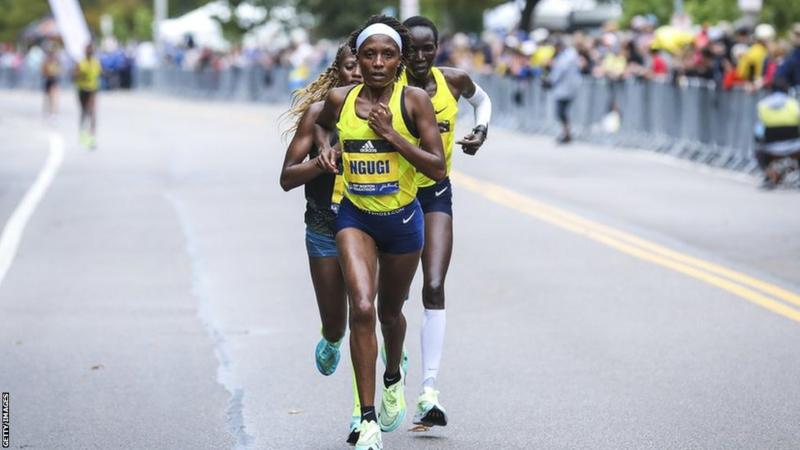Kenya’s Mary Ngugi says athletes who dope are “greedy” and need to realise that “money isn’t everything”.
The long distance specialist, who finished ninth in Monday’s Boston Marathon, has suffered emotionally and financially as a result of an athlete using drugs.
Ngugi’s best performance in Boston came in 2021 when she initially finished third before being promoted to second place after winner Diana Kipyokei, a fellow Kenyan, was retrospectively disqualified and banned for six years for using banned substances.
“That race meant so much because I’d come from a hard year. I had lost my contract,” Ngugi told BBC Sport Africa.
“I was so happy to finish third, so imagine what it would have meant for me to finish second. That is something that I can never get back.”
This year’s race – which marked 10 years since a terrorist attack claimed the lives of three spectators and injured hundreds more – saw winners of the men’s and women’s events rewarded with prize money of $150,000. But the drop-off after that was relatively steep, with the runner-up earning $75,000, third place $40,000 and $25,000 for fourth.
So perhaps it is no surprise that Ngugi believes the events of 2021 also cost her financially.
“Had I been second, my contract would have been different coming to Boston for the next appearance fee. Everything would have been different.
“This is like stealing.”
From left to right: : Lucy Wangui Kabuu, Mercy Jerotich Kibarus, Gladys Cherono, Mary Wacera Ngugi and Selly Chepyego Kaptich of Kenya celebrate winning the Gold medal for the team race during the IAAF/Al-Bank World Half Marathon Championships on March 29, 2014 in Copenhagen, Denmark.
Mary Ngugi (second from right) has won two gold medals as part of Team Kenya at the World Half Marathon Championships (2014 & 2016)
Athletes need ‘integrity and respect’
Kenyan athletics is currently fighting an ongoing battle to restore its damaged reputation when it comes to doping.
Last year, the country narrowly avoided a ban from international competition.
Ngugi believes greed and a desire for quick results is driving the problem.
“They’re being taught money is everything,” said the 34-year-old, who won World Half Marathon Championship gold medals in 2014 and 2016.
“Money is not everything. It’s also about your career when you retire, when you’re 70 years old.
“What will you tell your children? I would rather be third, fourth, fifth, but I know this is me. I didn’t cheat or steal from anyone.
Why did Mary Ngugi start Kenya’s first all-girl running club?
“They want to break the world record tomorrow. It takes time. Don’t start today and the next year you want to win a major. It doesn’t work like that.
“They’re being greedy.”
Kenya still dominated this year’s Boston Marathon, with Evans Chebet defending his title in a men’s race where half of the top ten hailed from the East African nation, including Olympic champion Eliud Kipchoge who was running the race for the first time. Kenya’s Hellen Obiri also claimed the women’s crown.
Kenya looks to criminalise doping
Medals ‘no longer the priority’ for Kenyan athletics
No ‘drug cover-up’ in Kenya – Lord Coe
With athletics forming a crucial part of Kenya’s image both at home and abroad, Ngugi believes drug cheats should think more carefully about their actions.
“Athletes need to have integrity and respect their job, because this is not just anything,” she urged.
“Respect other athletes. When someone comes to you, learn to say no, I don’t want to do this. And don’t cheat.”
